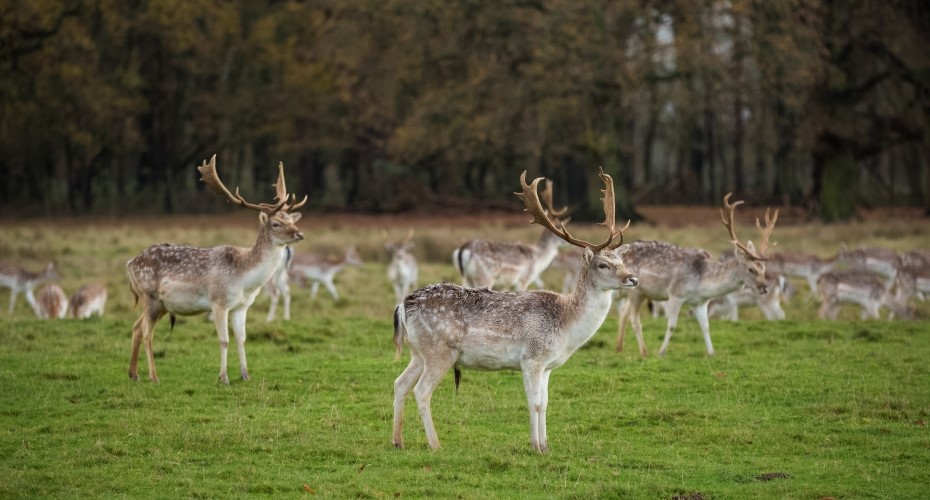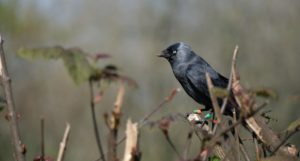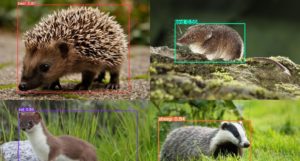Community-led deer management could bring ‘cascade’ of benefits

Fallow deer herd at Attingham Park ©National Trust. Image: James Dobson
Community involvement in managing deer populations could deliver a cascade of benefits for biodiversity, climate change, food sustainability and rural livelihoods.
In a new report from the National Trust and the University of Exeter, experts propose that a collaborative approach to deer management could help control large deer populations while providing benefits for nature and boosting food supplies.
Deer numbers have been rising in parts of the UK, particularly over the last 30-40 years, with negative impacts including damage to trees and crops. Many regions of the UK are ideal for deer, and with key natural predators such as wolves now extinct in the UK, land managers use culling to limit numbers.
However, outside Scotland this is rarely coordinated across large areas, and the wider public have little involvement in making decisions about deer management.
According to the report, a greater diversity of stakeholder perspectives, including those of local communities, could transform deer management.
“At present, deer management is rarely discussed in detail publicly,” said Dr Michelle Twena, one of the report’s authors. “It’s carried out piecemeal, in different ways by different land managers, and many are nervous about controversy over culling. We are proposing a holistic, community-orientated way of framing this issue, bringing in a variety of voices.”
Researchers from RENEW – a biodiversity renewal project led by the University of Exeter and the National Trust – carried out a series of workshops in the South Downs with a wide range of interested parties, including policy experts, conservation and animal welfare groups, wildlife managers, food distribution and justice organisations, private landowners, and local councillors from Sussex and West Sussex.
“The aim was to create a non-adversarial culture, to help different stakeholders understand each other’s worldviews, priorities, values and perspectives,” said co-author Dr Clare Bissell. “This allowed for the expansive, aspirational thinking that is key to identifying new, progressive solutions. People left with a better understanding of other perspectives, and the people who held them.”
Co-author David Bavin added: “This is an important aspect of how we manage our environment, and we need to have a public conversation about it. Large deer populations can limit biodiversity by over-grazing on vegetation such as hedges, young trees and crops, and can also spread diseases (including Lyme disease) and increase road collisions.
“Effective management can lead to multiple benefits, but it is often a ‘top-down’ choice by landowners, with community involvement often lacking. Better communication could lead to a shared understanding that management is necessary in places and can be done in a humane way that brings benefits not only for nature but also in terms of food supply.”
As well as allowing thoughtful discussion of the environmental case for deer management, public involvement can ensure the benefits of humane culling are shared, for example by venison (deer meat) being made more widely available to the food justice sector, including foodbanks.
Participants agreed that increasing access to wild venison – a sustainable, healthy protein source – could benefit both communities and conservation.
The key recommendations from the research are:
- All those involved in managing deer should adopt an approach which recognises and emphasises connections between people and nature.
- Deer managing stakeholders should embrace the value of diverse voices and practitioners.
- Those managing deer should engage with organisations that seek to provide nutritious affordable food for all.
- Stakeholders should share data, evidence, and experience via a dedicated platform.
- Deer management networks should be established and evolve to embrace new sectors and collaborators.
- It is important to build trust between organisations, and with wider publics.
- Deer managing stakeholders should take a joint ownership approach to communications.
- Public policy should facilitate and incentivise collaborative deer management.
Prof. Matt Heard, Head of Environmental Research at the National Trust, concluded: “There could be many benefits from controlling deer humanely at a landscape scale, for people, communities, and nature. Landowners, land managers, and the wider community have the potential to unlock these benefits through collaborative action, and organisations and individuals should take the initiative to make this happen.”
The next steps for the research team are to re-convene the workshop participants alongside a wider group of stakeholders to reflect on and discuss the report’s findings, and to support conversations about how the research recommendations might be incorporated into deer management practices throughout the UK.
The report “Seeing the forest for the deer: A participatory process to support stakeholder collaboration in landscape scale deer management” is available here.
Find out more about RENEW here.



